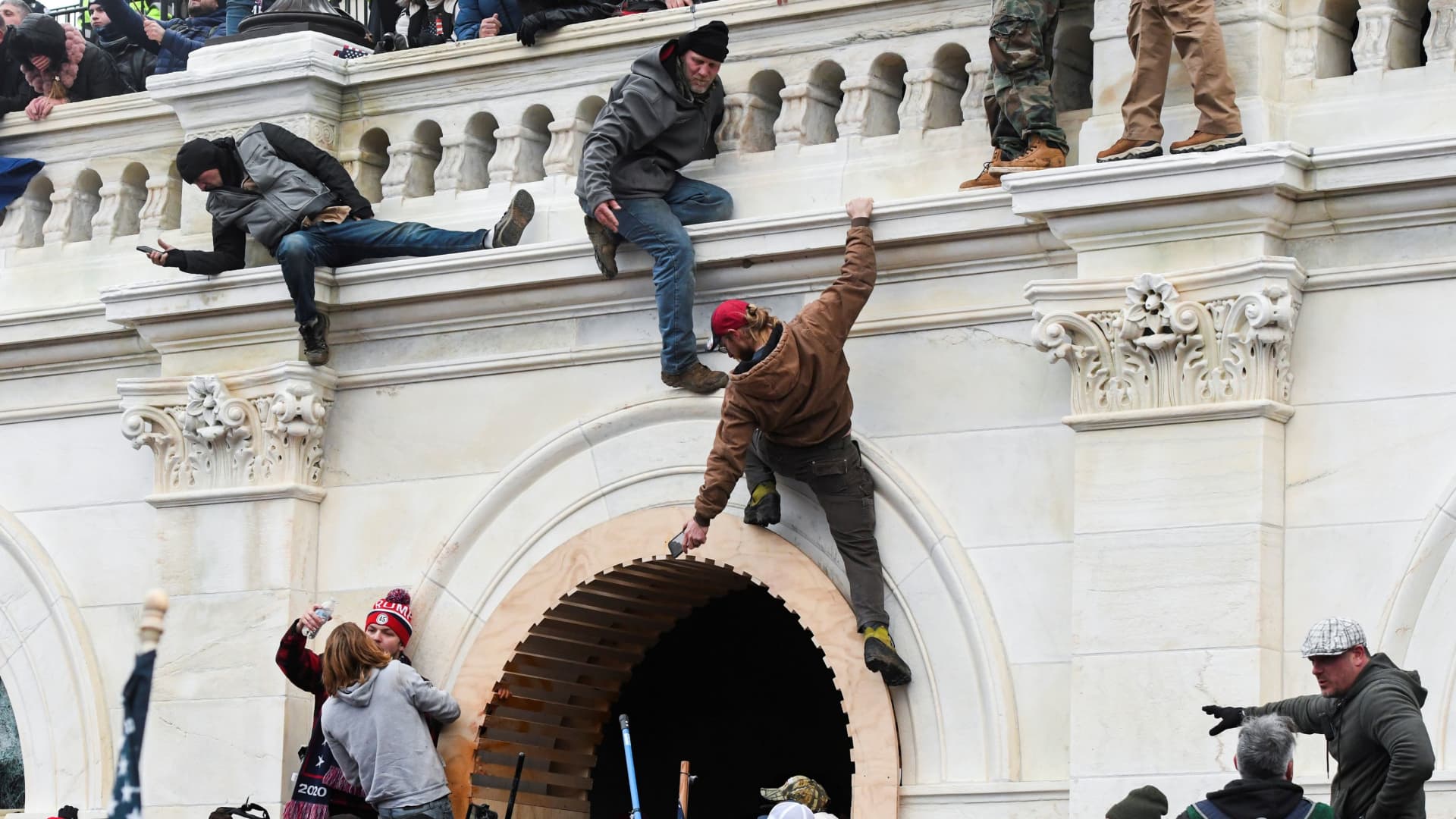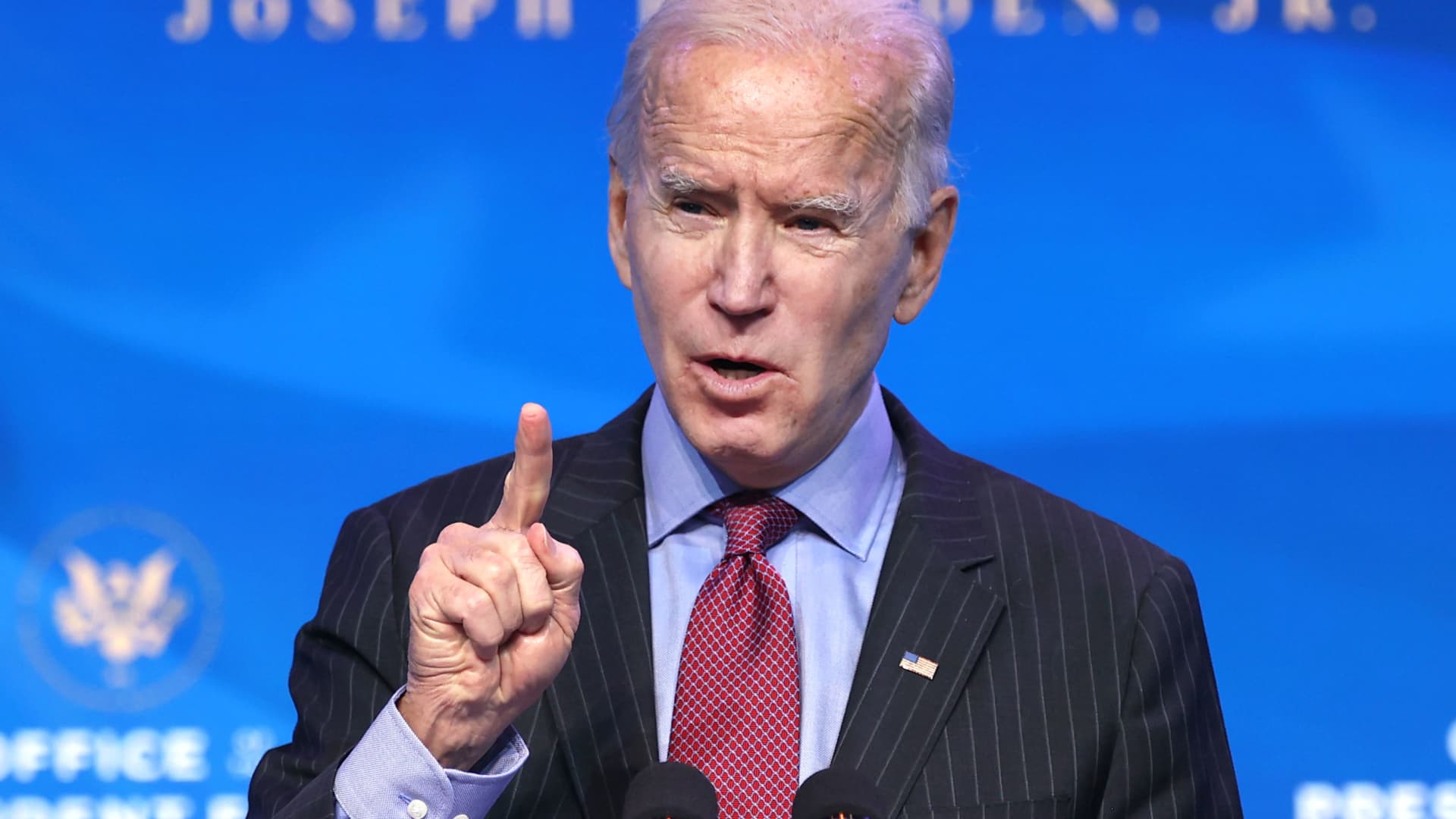
- Democrats in the U.S. House of Representatives on Monday plan to introduce articles of impeachment with language on the incitement of insurrection.
- Speaker Nancy Pelosi has been exploring a second option that Vice President Pence and the Cabinet remove Trump through the 25th amendment.
- Some argue that the best course would be to shun the president, deprive him of attention, ensure guardrails prevent him from dangerous acts and have the clock tick out on Jan. 20.

A lawyer friend tells me there's a powerful prima facie case, which means enough corroborating evidence exists to support charges, that President Donald Trump at the very least violated federal law on insurrection and rebellion.
That U.S. code reads: "Whoever incites, sets on foot, assists, or engages in any rebellion or insurrection against the authority of the United States or the laws thereof, or gives aid or comfort thereto, shall be fined under this title or imprisoned not more than ten years, or both, and shall be incapable of holding any office under the United States."
Democrats in the U.S. House of Representatives on Monday plan to introduce articles of impeachment with similar language on the incitement of insurrection.
Speaker Nancy Pelosi would prefer that the House threat, which would make Trump the only president to have been impeached twice, prompt the president to resign before his term ends on Jan. 20. She also has been exploring a second option that Vice President Pence and the Cabinet – or the vice president and a non-partisan group established by legislation – remove Trump through the 25th Amendment.
Some Republicans, who hope to regain influence over the party after the Trump presidency, argue that the best course would be to shun the president, deprive him of the attention that is his oxygen, ensure guardrails prevent him from dangerous acts in the coming days, and have the clock tick out on Jan. 20. Even some Democrats prefer this approach to avoid energizing Trump and his millions of supporters with further grievances.
So, which among these options would provide the United States the best chance to most quickly heal at home so that it can act more effectively abroad?

As unlikely as it seems that Trump would embrace this course, his resignation in the next week would serve him and the country best. Even The Wall Street Journal editorial board, that bastion of American conservatism, argues that resignation would be the best-case outcome.
Money Report
Trump's resignation would provide President-elect Joe Biden his best "shot" (with a nod to Hamilton) at being the healing and unifying leader he aspires to be, allowing the country to avoid another polarizing impeachment brawl. It also would be the one that best leverages for positive gain the horrifying events of last week that were so closely followed by the edifying congressional certification of November's elections.
In those few hours, a worried nation and world witnessed both the vulnerability and resilience of what former Polish President Aleksander Kwasniewski this week at the Atlantic Council called the "world's guarantor of democracy. The country where institutions work and there is rule of law."
For that guarantor to fail, and "at the direction of the American president is something unacceptable," Kwasniewski argued. The impact would be disastrous not just for American prestige but for its impact on other world democracies. If it can happen in Washington, goes his logic, it can happen anywhere.
Coming back to The Wall Street Journal editorial, it called this week's attack on the Capitol "an assault on the constitutional process of transferring power after an election… This goes beyond merely refusing to concede defeat. In our view it crosses a constitutional line that Mr. Trump hasn't previously crossed. It is impeachable."

After consideration of the pros and cons of impeachment, however, the Journal said President Trump's resignation would be the "cleanest solution" in that it would turn presidential duties over to Vice President Pence, spare Americans another polarizing impeachment fight and give Trump "agency, a la Richard Nixon, over his own fate."
"It is best for everyone, himself included, if he goes away quietly," concluded The Journal. It might have added, "and steps away from public life, as did Nixon."
It would also most quickly allow President Biden to focus on the myriad challenges facing him: the ongoing pandemic, its accompanying economic threats and ongoing challenges from Russia and China. This week's further Chinese crackdown on what's left of democracy proponents in Hong Kong, following the recent Russian cyber attack on U.S. institutions, both underscore the rising cost of U.S. distraction.
To that purpose, Biden hopes to convene a summit of democracies during his first year in office to "get the band back together," in the words of one of his top advisors. Some argue this week's events should prompt a chastened United States to retreat from that sort of global ambition. Instead, the lesson must be that strength among democracies comes in numbers, partnerships and alliances. They are needed now more than ever in recent memory.

I argued in a commentary earlier this week, under the headline "Learning from the abyss on Capitol Hill", that "it's not enough to simply condemn Wednesday's dangerous, destructive, and illegal violence and the irresponsibility that triggered it. The trauma should prompt us to redouble our efforts within the United States and among allies and partners to simultaneously strengthen our principles and our bonds."
It was telling that President-elect Biden this week didn't publicly embrace impeachment, the 25th amendment or Trump's resignation. "I'm focused on my job," was Biden's refreshing reply, with Covid-19 atop his to-do list.
Biden understands that his success rests on marginalizing Trump and the forces he unleashed this week – and remain a present threat – rather than magnifying them further. He must find Republicans with whom he can work by building rather than burning bridges.
He understands that he and congressional Democrats must even try to work with legislators – 139 House members and 8 in the Senate — who opposed the certification of his electoral victory. The burden should be on those members to demonstrate they are willing to participate constructively in U.S. democracy, working with the new administration, showing up at the inauguration and accepting the Biden-Harris leadership legitimacy.
Biden knows it has been reconciliation and not retribution that has strengthened democracies historically. His challenge will be how best to expand the reasonable center on which all durable democracies depend, while law enforcement and judicial organs punish those who committed crimes this week or incited them.
As President-elect Biden said in his victory speech in November, "We lead not by the example of our power, but by the power of our example." Biden's historic challenge will be showing the world that this week's brush with disaster isn't an example of weakness but can be a catalyst for U.S. democratic renewal. And renewal at home is the best course to increase America's effectiveness abroad.
Frederick Kempe is a best-selling author, prize-winning journalist and president & CEO of the Atlantic Council, one of the United States' most influential think tanks on global affairs. He worked at The Wall Street Journal for more than 25 years as a foreign correspondent, assistant managing editor and as the longest-serving editor of the paper's European edition. His latest book – "Berlin 1961: Kennedy, Khrushchev, and the Most Dangerous Place on Earth" – was a New York Times best-seller and has been published in more than a dozen languages. Follow him on Twitter @FredKempe and subscribe here to Inflection Points, his look each Saturday at the past week's top stories and trends.
For more insight from CNBC contributors, follow @CNBCopinion on Twitter.






